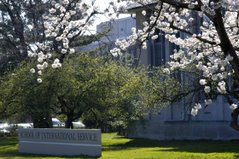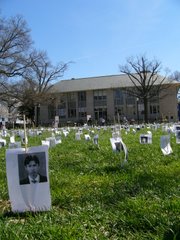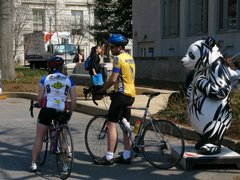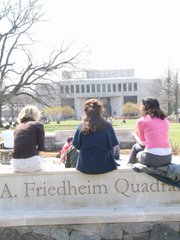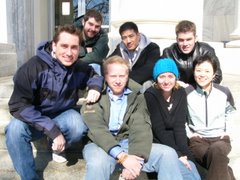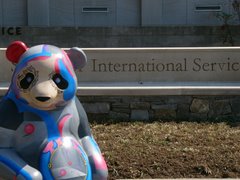Many prospective students are curious to know whether studying at American University can improve their odds of landing a resume-boosting internship; it can. This only happens by capitalizing on the wealth of career resources that are available to AU students, and there is no automatic guarantee that flashing AU on a resume will suffice to secure a competitive position in the nation’s capital. What does secure an internship is information, and AU grants its students access to the most current databases through email subscriptions in order to enable them to be among the first to discover and apply for newly created internship positions in the D.C. area.
In my own experience, I learned of the FBI’s Volunteer Internship Program through the SIS Listserv and was able to round up the materials needed in time to submit an application for it. In this particular case, the position I was applying for had been reserved exclusively for AU’s School of International Service graduate students, which was helpful because that whittled away a fair share of the D.C. competitors that would otherwise have flooded the application process. One month later, I received a call from an FBI agent requesting an interview with me, and during my subsequent interview with him I answered several of his questions with references back to experiences from my first semester at AU. Two weeks after that, I got called back for a second interview, and although I have yet to officially sign a contract, I’m told that I'm very likely to receive an offer from the FBI in the near future.
I would never have known to apply if I hadn’t read about the opportunity through a listserv email. Ideally, I would constantly be on the lookout for job and internship openings by searching the websites of various government agencies, but the luxury of online browsing is limited for me since my time is more often consumed by the heavy workload that comes with pursuing a M.A. So, the convenience of having had the information about that internship come to me—instead of having to go scout it out myself—was invaluable. This is just one example of the ways in which AU’s resources provide students with advantages that inevitably enhance their chances of getting a head start on their careers while going to school full-time.
SIS AUDIO LIBRARY
The SIS Audio Library allows you to hear recent speakers and professors, providing insight into current and relevant political and social issues of our time. Their expert instruction and a variety of guest speakers are just a click away at:
http://www.american.edu/sis/pouch/sisaudio.html
Friday, April 27, 2007
Friday, April 20, 2007
We’re all just ‘Tree-huggers’

Reflections from a Global Videoconference on Climate Change and Oil Dependence at the World Bank
In this office we get into some heated debates. Sometimes they center on our ideals for the justices of tipping our waiters, but oftentimes they extend well beyond our daily lives to the bigger questions in life—how do we solve any of these global problems?
We are always educating and informing one another about our various backgrounds and expertise, enlightening again and again from the various facets of our knowledge. I, personally, am always talking about trees. Andy, Jeremy, and Josh tend to focus on nuclear war. Kathleen is in the Middle East, whereas Gabe and Fred are posing China and Asia’s viewpoint to our questions. We seem separated by our disciplines, but from attending a World Bank Conference today, I am reminded that our focuses are much more intertwined than at first glance and maybe…we are all tree-huggers after all.
I had the privilege, an invitation often offered to AU students, to attend a World Bank global videoconference related to climate change and oil dependence. The conference was sponsored by Americans for an Informed Democracy and highlighted Ian Noble from the World Bank, U.S. Representative Edward J. Markey of Massachusetts, 2020 Vision Executive Director Tom Z. Collina, the Dean of Environmental Engineering and Geology via satellite from Ecuador and numerous university campuses around the U.S. The purpose of the videoconference was to engage Americans in global conversation about policy and more specifically, about climate change. We’ve been labeled the ‘green generation’ and with that labeling, given a formidable task to right quite a few of the wrongs from past generations. And these wrongs do not limit themselves to the environmental realm. One thing I have become blatantly aware of through numerous discussions in grad school is that everything is so much more connected than I ever imagined. Which is why we are all tree-huggers after all. And why I should be just as concerned about nuclear warheads and political stability as my colleagues should be about those trees.
The debate that unfolded throughout this conference touched on everything each of us in this office has studied, analyzed and is struggling to understand and find answers for. Discussions ranged from mitigation and adaptability strategies in developed and developing countries; comfort level and sacrifice; oil dependency and ultimate security in a nation; democracy; food supplies; policies both local and global; poverty reduction and technology, just to name a few. Foreign relations are deeply tied to any mitigation and adaptability scheme as well as when and how we push for different technologies. Any type of policy for the future should contain a way to incorporate the risks of climate change, because they affect development, security, international relations, power and economics. I need to care about the security of a nation, because no development occurs in a battlefield. And that could highly depend on oil dependence and foreign relations. And my counterparts need to care about the resources of a country in order to understand their real position related to development and security. We are much more linked than I could have ever imagined and it took climate change for me to see it.
Which makes me a little more optimistic about our discussions. We’re becoming experts in our respective fields, but we are also learning how to teach each other. This is important, because our work for the future requires us to understand all of these complexities. It is absolutely unavoidable. And I couldn’t think of a better team to face those challenges with, although begrudgingly they might not admit to their inner ‘tree-hugger’… but we’ll get there. And I’ll cross over too, since we’re in this together.
In this office we get into some heated debates. Sometimes they center on our ideals for the justices of tipping our waiters, but oftentimes they extend well beyond our daily lives to the bigger questions in life—how do we solve any of these global problems?
We are always educating and informing one another about our various backgrounds and expertise, enlightening again and again from the various facets of our knowledge. I, personally, am always talking about trees. Andy, Jeremy, and Josh tend to focus on nuclear war. Kathleen is in the Middle East, whereas Gabe and Fred are posing China and Asia’s viewpoint to our questions. We seem separated by our disciplines, but from attending a World Bank Conference today, I am reminded that our focuses are much more intertwined than at first glance and maybe…we are all tree-huggers after all.
I had the privilege, an invitation often offered to AU students, to attend a World Bank global videoconference related to climate change and oil dependence. The conference was sponsored by Americans for an Informed Democracy and highlighted Ian Noble from the World Bank, U.S. Representative Edward J. Markey of Massachusetts, 2020 Vision Executive Director Tom Z. Collina, the Dean of Environmental Engineering and Geology via satellite from Ecuador and numerous university campuses around the U.S. The purpose of the videoconference was to engage Americans in global conversation about policy and more specifically, about climate change. We’ve been labeled the ‘green generation’ and with that labeling, given a formidable task to right quite a few of the wrongs from past generations. And these wrongs do not limit themselves to the environmental realm. One thing I have become blatantly aware of through numerous discussions in grad school is that everything is so much more connected than I ever imagined. Which is why we are all tree-huggers after all. And why I should be just as concerned about nuclear warheads and political stability as my colleagues should be about those trees.
The debate that unfolded throughout this conference touched on everything each of us in this office has studied, analyzed and is struggling to understand and find answers for. Discussions ranged from mitigation and adaptability strategies in developed and developing countries; comfort level and sacrifice; oil dependency and ultimate security in a nation; democracy; food supplies; policies both local and global; poverty reduction and technology, just to name a few. Foreign relations are deeply tied to any mitigation and adaptability scheme as well as when and how we push for different technologies. Any type of policy for the future should contain a way to incorporate the risks of climate change, because they affect development, security, international relations, power and economics. I need to care about the security of a nation, because no development occurs in a battlefield. And that could highly depend on oil dependence and foreign relations. And my counterparts need to care about the resources of a country in order to understand their real position related to development and security. We are much more linked than I could have ever imagined and it took climate change for me to see it.
Which makes me a little more optimistic about our discussions. We’re becoming experts in our respective fields, but we are also learning how to teach each other. This is important, because our work for the future requires us to understand all of these complexities. It is absolutely unavoidable. And I couldn’t think of a better team to face those challenges with, although begrudgingly they might not admit to their inner ‘tree-hugger’… but we’ll get there. And I’ll cross over too, since we’re in this together.
Tuesday, April 3, 2007
Perspective from the END...
Hello! I’m part of the SIS bloggers crew, but have been a bit MIA, trying to take advantage of my LAST spring break, probably forever... So, I went to Spain, he!
I’m graduating in May, finishing up my two-year term here at AU, but in a program a bit different from my colleagues. My program, Natural Resources and Sustainable Development, is a dual degree program with the University for Peace in Costa Rica. What does that mean exactly? I attended school for two years, one of those years in Costa Rica and I will receive two Master’s degrees for my time; sweet, no?! My program provides students’ exposure to Northern development and environmental theory and conversely immerses them in the Global South, to examine how that differs. Many of the students in my program have served for the Peace Corps or similar programs, have an immense amount of real-world experience and are hoping to broaden their ‘skills tool-box’ by understanding the theories behind most development. It’s a generalist degree that covers a broad gamut of topics—environmental science, environment and development theory and policy, conservation, economics, social and community relationships, trade and agriculture, etc…
I’m in my last few months.. to be quite honest, it’s no picnic. There are times when I think I really just can’t read anymore and regurgitate it back into a concise, analyzed form. But, then there are those moments when you talk to someone who has thought twice about the paper they are throwing away and their own carbon foot-print… and it just brings you right back up again to what this was all about in the first place…. Saving the world! Well… saving any small part of it, at least. Not that the North or I will always have the answers, like we might like to think… and I’m very appreciative of my experience. I feel I have really gained an insight unbeknownst to most… the other side.
It’s hard to remember how it was in those first few semesters, especially in my program that is uncharacteristically transient. This is the perspective from the end, when it’s all practically over (but yet, there is so much more work still left to do, auughh!!)… It’s a great ride- enjoy it, relish in it. You will, in the end, be very glad you went for it.
Heather :)
I’m graduating in May, finishing up my two-year term here at AU, but in a program a bit different from my colleagues. My program, Natural Resources and Sustainable Development, is a dual degree program with the University for Peace in Costa Rica. What does that mean exactly? I attended school for two years, one of those years in Costa Rica and I will receive two Master’s degrees for my time; sweet, no?! My program provides students’ exposure to Northern development and environmental theory and conversely immerses them in the Global South, to examine how that differs. Many of the students in my program have served for the Peace Corps or similar programs, have an immense amount of real-world experience and are hoping to broaden their ‘skills tool-box’ by understanding the theories behind most development. It’s a generalist degree that covers a broad gamut of topics—environmental science, environment and development theory and policy, conservation, economics, social and community relationships, trade and agriculture, etc…
I’m in my last few months.. to be quite honest, it’s no picnic. There are times when I think I really just can’t read anymore and regurgitate it back into a concise, analyzed form. But, then there are those moments when you talk to someone who has thought twice about the paper they are throwing away and their own carbon foot-print… and it just brings you right back up again to what this was all about in the first place…. Saving the world! Well… saving any small part of it, at least. Not that the North or I will always have the answers, like we might like to think… and I’m very appreciative of my experience. I feel I have really gained an insight unbeknownst to most… the other side.
It’s hard to remember how it was in those first few semesters, especially in my program that is uncharacteristically transient. This is the perspective from the end, when it’s all practically over (but yet, there is so much more work still left to do, auughh!!)… It’s a great ride- enjoy it, relish in it. You will, in the end, be very glad you went for it.
Heather :)
Subscribe to:
Comments (Atom)
